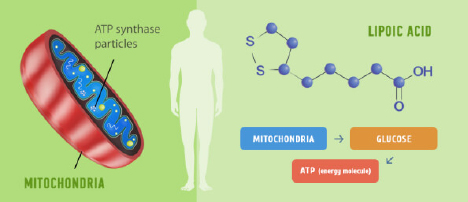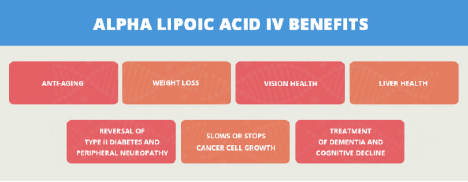ALA IV Treatment
An ALA IV treatment (alpha-lipoic acid) at Neighborhood Naturopathic can give your body the nutrients it needs to stay well and for you to feel better. Alpha-lipoic acid is a powerful antioxidant that works with the mitochondria — the body’s energy powerhouses — to boost metabolism, prevent inflammation, eliminate toxins and reverse some of the oxidant (free radical) damage related to aging. It is also used in adjunctive cancer care. Our bodies naturally synthesize this compound but only in small amounts.
Alpha-Lipoic Acid IV Treatments Have Many Benefits
As an antioxidant, alpha-lipoic acid has many wellness benefits, including its ability to protect the body’s cells against free radicals, which are unstable molecules that naturally occur in our body that can damage proteins, DNA and cell membranes. Just a few of the benefits of an alpha-lipoic acid treatment from Neighborhood Naturopathic may include:
- Eliminates unwanted toxins like metals or mycotoxins
- Restoration of other antioxidant levels
- Reduction in blood sugar levels
- Symptom improvement in diabetic or chemotherapy related peripheral neuropathy
- Slow cell damage caused by free radicals and environmental toxins
- Support energy production(mitochondria)
Why Receive ALA IV?
- Adjunctive cancer care
- Mold and heavy metal toxicity
- Diabetes and insulin resistance
- Neuropathy and neuropathic pain
- Lyme disease
- Degenerative illness
IV Infusion of Alpha Lipoic Acid
When delivered via intravenous drip therapy, ALA bypasses the digestive tract and directly enters your bloodstream. From there, it is quickly routed to depleted cells throughout your body for immediate use. For the treatment of serious diseases and health conditions, IV therapy is the delivery method of choice.
Many people will do 10-12 weekly ALA infusions and then do a maintenance IV every 3-5 weeks. IV-ALA can be administered the same day as high dose IVC in adjunctive cancer care. IV-ALA is also a common ad-on in other formulas like a Myers for antioxidant and mitochondrial(energy) support.
Additional ALA IV Information
Alpha lipoic acid (ALA) is an antioxidant found in every cell of the human body. Antioxidants are compounds that inhibit cellular oxidation, a process that produces free radicals that can damage cells and undermine their function. ALA is sometimes referred to as the universal antioxidant because it supports other antioxidants like vitamins C and E, and glutathione. ALA is involved in multiple antioxidant functions in virtually all body tissues, protecting your body’s organs and systems from damage so they can keep you fit and healthy.
Role of Lipoic Acid in Human Health
Alpha lipoic acid (ALA) is an antioxidant found in every cell of the human body. Antioxidants are compounds that inhibit cellular oxidation, a process that produces free radicals that can damage cells and undermine their function. ALA is sometimes referred to as the universal antioxidant because it supports other antioxidants like vitamins C and E, and glutathione. ALA is involved in multiple antioxidant functions in virtually all body tissues, protecting your body’s organs and systems from damage so they can keep you fit and healthy.

In addition to its role as a powerful antioxidant, ALA is critical to mitochondrial health. Mitochondria are tiny organelles inside human cells that help convert glucose to ATP, the energy molecule, through a series of chemical reactions. Lipoic acid is a highly essential cofactor in the mitochondrial energy production cycle that enables cellular respiration and ATP production. Mitochondrial dysfunction has been linked to aging and disease in humans, and ALA supports mitochondrial health.
ALA is also fundamental to the breakdown of amino acids, the essential elements of proteins that are vital to new cell production. Your body’s cells are continually turning over, replacing old dying cells with new ones. As we age, cellular turnover naturally slows down. Insufficient levels of lipoic acid can reduce your body’s ability to replace old cells, which can speed up the aging process.
Your body makes a small amount of ALA on its own, and a nutrient-rich diet of vegetables and humanely sourced red meat gives you the building blocks to produce sufficient amounts for optimal health. Nevertheless, some people need to supplement ALA to manage and overcome certain health conditions, through oral supplements or via IV infusion therapy.

- Anti-aging: Oxidative stress and free radicals are primary contributors to the aging process, damaging skin cells, vital organs and cellular mitochondria. ALA’s powerful antioxidant properties fight oxidative stress and protect cells from damage, slowing the aging process. ALA also fights systemic inflammation which is a major contributor to metabolic disorders like heart disease, hypertension and diabetes.
- Weight loss: ALA enhances your cells’ ability to use glucose to produce energy. Greater energy expenditure tips the scales in your favor as you burn more fuel, helping you to reduce fat stores and rev up your metabolism.
- Vision health: Many people experience vision problems in middle age that worsen over time. ALA fights oxidative stress that can damage optical nerves and cause eye-related disorders like retinal damage, macular degeneration, glaucoma, cataracts and vision loss.
- Liver health: Your liver is a vital organ that performs multiple functions, making it pivotal to human health. ALA promotes liver health by protecting liver cells from oxidative stress damage and supporting the neogenesis of new liver cells. ALA therapy is used to fight many liver problems, including hepatitis B and C, autoimmune hepatitis, primary biliary cirrhosis, and other liver conditions.
- Reversal of Type II diabetes and peripheral neuropathy: ALA improves insulin sensitivity of the cells, enabling them to use circulating glucose for energy production, thereby lowering your blood sugar. ALA via IV infusion has been found to be effective in treating conditions associated with diabetes, including diabetic peripheral neuropathy.
- Slows or stops cancer cell growth: Multiple studies have found ALA to be beneficial in the treatment of cancer. ALA has been shown to decrease the proliferation of cells in breast, ovarian, colorectal, and lung cancer. It also appears to slow the progression of pancreatic and thyroid cancer, and to enhance the efficacy of chemotherapy.
- Treatment of dementia and cognitive decline: ALA is able to penetrate the blood-brain barrier to protect the mitochondria in brain tissue. It offers hope to Alzheimer’s and other patients who suffer from memory loss, motor impairments and reduced cognitive function. ALA is also being studied as an effective treatment for multiple sclerosis.
